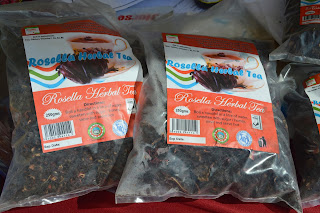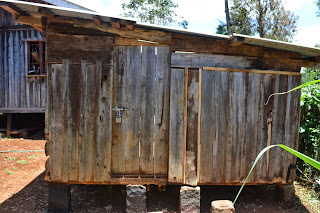 |
| Pure Boran cattle at the Munyu ranch |
Mr. and Mrs Francis Kimani
cannot recall the last time they bought beef, mutton or chicken at a butchery. When
Mrs. Violet Kimani has chicken on her menu for dinner, Mr. Kimani drops by their farm and brings home healthy looking kienyeji (local) chicken.
The young couple has 95 cattle, 196 goats and
sheep on their 11 acre land in Munyu, Kiambu County. They also have several bee hives, chicken and turkey on the farm. At the age of 30 and 27
years respectively, Mr and Mrs. Kimani may so far sound to many young people
like a couple that lives in a village somewhere, where all they do is farming.
Well, you would be wrong to judge them as so.
 |
| Mrs. Violet and Mr. Francis Kimani at their ranch |
The two graduates are
rising high on the corporate ladder with their careers. Mrs Violet Kimani for
instance, is the Founder and Director of Van kym Consultancy East Africa, the
only public relations firm based in Thika town. They are not jobless people who
decided to turn to agriculture because they could not find good jobs. They are
entrepreneurs who saw an opportunity in pedigree breeding and farming.
Pedigrees
fetch much more in the market
Pedigrees are pure
breeds of goat and sheep kept for either meat or milk. Mr. and Mrs. Kimani have
15 pedigree Doper sheep and 62 pedigree Galla goat reared purely for meat. They
also have 119 cross breeds.
The difference between
a pedigree sheep and a cross breed or a common breed is that after one year a
pedigree weighs 150 kgs live weight and the common breed weighs only 80 kgs. In
the market, at three months the pure breed or pedigree sheep will cost Ksh.
25,000 while the first generation (FI) of a cross breed costs Ksh. 15,000 and
the second generation (F2) of a cross breed costs Kshs. 17,000.
 |
| Six months old pure Doper sheep weighing 75kgs |
Just in case I lost you
there with the cross breed generations I will try explaining it. A common breed
doe (female goat) served with a pure breed buck (male goat) will reproduce a
cross breed of the first generation, F1. When the cross breed doe is served with
a purebred buck the kid is a cross breed of F2 generation. Serving an F2 cross
breed doe with pure breed buck will give you a new line of pure breeds.
Mr. and Mrs Kimani
target the festive seasons of the year to reap from their flock of sheep and
goats. Their top customers are individuals who buy livestock for meat and
farmers who seek for breeders. On average the couple fetches about Kshs. 80,000
from their goats and sheep each festive season. Considering their large farm
has cattle, chicken and turkey as well, the youthful farmers have a bounty reap
during festive seasons such as Easter, Christmas and Ramadhan.
Keeping livestock will
always put some money in your pocket even off festive seasons. Each evening Mr.
and Mrs. Kimani pocket Ksh. 30,000 from the manure collected in the animals’
sheds. With the current buzz for organic farming, manure is high on demand. Farmers
are constantly searching for manure and the Kimani's have it in plenty as a byproduct.
“You can never go wrong
with farming. Keeping livestock whether for dairy or meat is the way to go,”
avers Mr. Kimani. “Land is fast diminishing in the country. The available land
is quickly being developed for real estate. I strongly feel that by 2030,
farmers will be the envy of many. Farming will be cool again because it will be
lucrative with a few players in it,” he continues.
 |
| The Kimani's flock of sheep and goats |
You
can start small
Mr. Kimani started his ranch
with three goats in 2010. Three years later his ranch is bee hive of activities
and a host to many animals. “I started livestock farming out of a passion I had
for pure breeds. It has now grown into an enterprise with time,” he observes.
The couple will soon
register their line of pure breeds with the Kenya Stud Book. This will see
their livestock tremendously appreciate in value. This will definitely add a
bounce to their happy walk to the bank.











